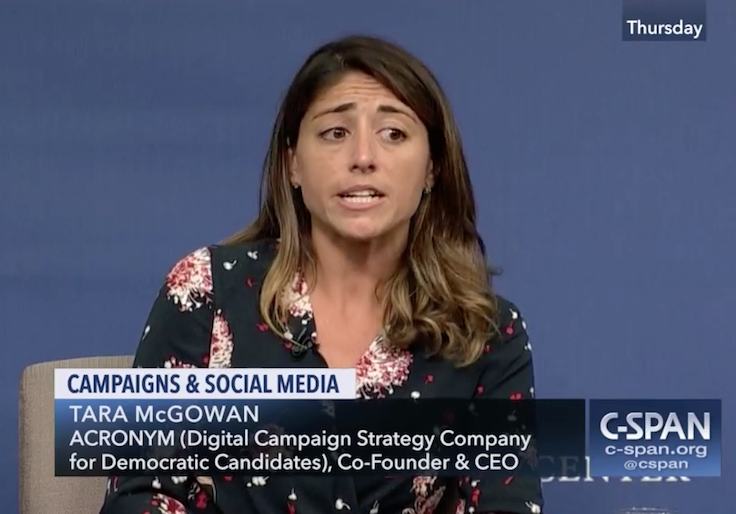Tara McGowan, whose Courier Newsroom project has been labeled "hyperlocal partisan propaganda" for its spreading of pro-Democrat messages on social media, announced Wednesday that she would speak later this month on a panel dedicated to "fake news and social media disinformation."
McGowan, CEO of the Democrat-aligned political firm Acronym, will appear on the panel, jointly hosted by Northeastern University-Seattle and the World Affairs Council of Seattle, on September 17. Slated to speak alongside her are journalists Davey Alba of the New York Times, Peter Hamby of Snapchat, and McKay Coppins of the Atlantic, which is owned by Acronym investor Laurene Powell Jobs.
The event's official page describes it as "a panel discussion," with participants covering "what's real and what's not, and how to reclaim control of your social media feeds." "Social media," it notes, "has become an indispensable tool for political campaigning and news delivery, but it's also used for nefarious purposes"—panelists will cover these trends.
McGowan's inclusion is surprising, given that Courier—an umbrella organization created and largely owned by Acronym, which in turn oversees "local" news sites that distribute pro-Democrat talking points—has spent millions distributing its stories on Facebook and other social media platforms. The group is the subject of a complaint filed Thursday with the FEC, seeking to compel it to register as a political committee.
Asked whether they were aware of the outstanding criticisms of Courier, NU-Seattle, the World Affairs Council of Seattle, Snapchat, and Alba did not return requests for comment. Coppins, who has written about McGowan previously, declined to comment. A spokesperson for Acronym said, "We fully understand your frustration with the Free Beacon not being invited to appear on this panel. There's always next year."
Announcing her participation in the panel on Twitter Wednesday, McGowan explicitly linked her panel appearance to the "progressive news network" that she says she created to "counter the rise of right-wing fake news + misinformation online (that's destroying our democracy) with...wait for it ...facts."
Acronym, a major player in the Democratic digital space, has put big money behind those "facts." Courier recently debuted a seven-figure ad campaign focused on bolstering the image of vulnerable House Democrats in the eyes of millions of Facebook users. That's on top of an estimated $3.6 million it has spent on Facebook ads alone.
Because Courier's affiliated sites do not acknowledge their partisan affiliation, users are generally unaware that the "news" they are served is meant to cast a favorable light on certain Democrats. Gabby Deutch, a correspondent with news watchdog NewsGuard, labeled the sites "hyperlocal partisan propaganda"—NewsGuard gave them failing grades for their "undisclosed partisan Democratic perspective."
Courier's status as a news organization also allows it to skirt restrictions usually imposed on political groups, including avoiding requirements to disclose its funders. Concerns about funding are at the heart of the FEC complaint, filed by a watchdog group affiliated with former Nevada attorney general Adam Laxalt (R.). The complaint argues that Courier should not be exempt from campaign finance disclosures. Both Facebook and Google have said they have plans to deny preferential treatment to "pink slime" sites like Courier masquerading as news.
Courier's "slime" has even attracted criticism in the media and among Democrats. CNN's Jake Tapper and Brian Stelter called Courier's model "a big problem," while Politico reported that even some Democratic operatives "believe Courier and Acronym’s tactics are unethical but also ineffective given the high cost."
Anna Massoglia, a researcher at the nonpartisan Center for Responsive Politics who has written extensively about Courier, told the Free Beacon that the site's model is not about "completely fabricated stories or disproven claims," but about "boosting Democrats under the guise of local news outlets."
"Spreading content based in fact sounds less ominous than spreading disinformation but readers may not approach Courier's articles with the same critical eye since the content is rooted in fact and is presented as coming from a trustworthy local outlet," Massoglia said. "This may leave readers unaware that Courier's state-focused media operations are part of a bigger network tied to a dark money operation funded by anonymous donors, keeping its funders hidden and keeping readers in the dark about whether content published by the outlets may be colored by their agendas."
Acronym's funders are known to include Powell Jobs, as well as LinkedIn founder Reid Hoffman and Dollar Shave Club CEO Michael Dubin. The Emerson Collective, Powell Jobs's "social change organization," has denied funding Courier directly, but she has steered substantial wealth towards its parent and other Democratic causes, even as her media investments were forced to take government bailouts.
